We live in a glorious age when books are a click away. It may now seem incomprehensible that one might be forced to read a series of books out of order. Yet, in a dark age not so long ago, when we (and by we, I mean me) were dependent on the vagaries of book store and library orders, it was very easy to find oneself in a place where the choice was (a) read an intermediate book or (b) read nothing new.
By way of example, here are five F&SF series I began in what most people would say is the wrong place.
Gray Lensman by E. E. Smith (1951)
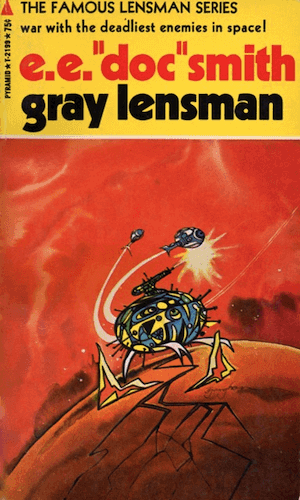
Gray Lensman begins in media res, as Kimball Kinnison and his Patrol chums finish the job of pounding what they believe may be Civilization’s enemy Boskone (not the convention) into rubble. Unfortunately for Civilization, this is not the end of Boskone. In fact, as Kinnison discovers, few in Civilization comprehend the true scale of their enemy’s efforts.
This felt like the second half of the story because it is. Any reasonable person would have begun with Galactic Patrol, which introduces Kimball Kinnison. Or they would have, if they had been aware how closely Gray Lensman followed on Galactic Patrol. I was not aware.
I understand that the original serial versions of the stories fed the reader clues about the Big Picture even more parsimoniously than did the paperback editions I read. Just as well that I started with the Pyramid mass market versions and not the relevant magazine issues, or I’d have been even more confused.
***
The City of Gold and Lead by John Christopher (1967)
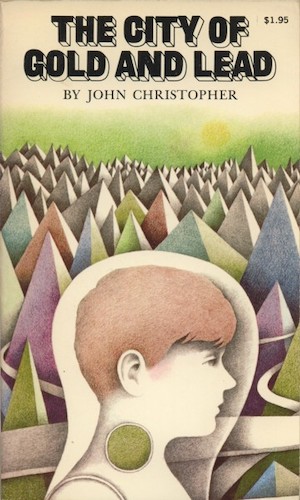
This is the second volume in Christopher’s Tripod series. This installment sees Will and his chums contending to win a coveted position as an abused slave within one of the alien strongholds. The work is demanding, the rulers of Earth are unpleasant, and what Will learns makes the human revolt far more urgent than it was. Pity, then, that those humans who enter the City of Gold and Lead never leave.
The City of Gold and Lead has a number of dramatic reveals whose impact is utterly undermined if one has not read the first book and so are unaware that there was any question of what was in the alien Tripod machines, or who exactly Eloise was or why the reader should care what happened to her. Nevertheless, it was interesting enough to get me to pick up other John Christopher books.
***
Spaceship to Saturn by Hugh Walters (1967)
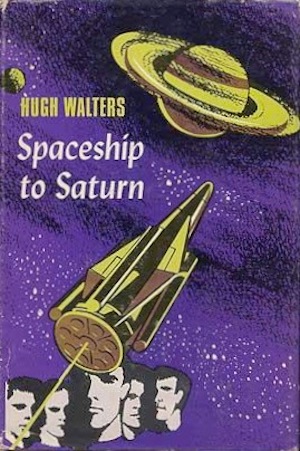
This book is the tenth in the U.N.E.X.A. series. Our small-statured hero Chris Godfrey and his spacefaring chums are dispatched to far Saturn. Being limited to somewhat plausible rockets, the trip is lengthy enough to require suspended animation. The communications challenges would have been intractable save for the fortuitous recruitment of telepathic sisters who can serve as living radios.
Progressing from barely suborbital rockets to true interplanetary vessels in just ten books would have been a lot more impressive had I first read the nine books before this installment. It was only on a recent reread of the first few books that I learned that not only is there considerable progress in rocket technology over the course of the series, the U.N.E.X.A. for which the series is named takes a number of volumes to appear. The early books featured Soviet/Western competition. By volume ten, U.N.E.X.A. was a done deal. Oh well. At least each installment in the series worked well enough on its own.
Let me note that when I first read this book I hadn’t yet read Heinlein’s Time for the Stars. If I had, I would have suspected that Walters had lifted the idea of telepathic spaceship communicators from Heinlein.
***
Dune Messiah by Frank Herbert (1969)
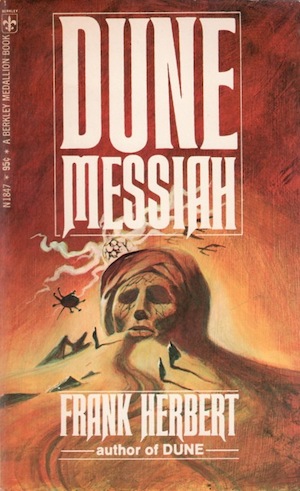
For some reason, Disco-era Waterloo Oxford DSS’ library only had the second Dune book, so for me the iconic Dune novel is the one in which our hero, having acquired fearsome powers of foresight in the previous installment, spends the novel desperately trying to find a way to avoid the future he can see bearing down on him. Being a big fan of Greek myth, full of doomed people setting in motion the events they hope to avoid by their efforts to escape fate, teen me thought that was pretty neat.
There were SF fans on staff at WODSS but I don’t think the librarian was among them. Thus the library owned but a single Herbert book and that not his most famous. In the librarian’s defense, despite owning other Herbert books (Under Pressure, Whipping Star, and The Dosadi Experiment), I didn’t think to buy Dune until I came across a copy of it four years after reading Dune Messiah. And then someone stole it before I could read it, and I didn’t replace it for some time….
***
Being Alien by Rebecca Ore (1989)
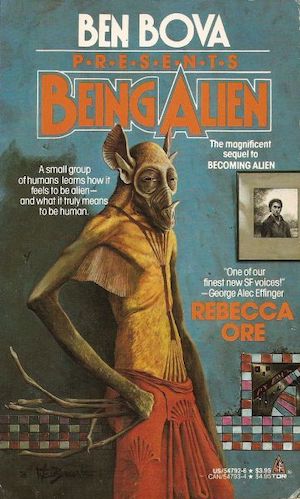
Tom Red-Clay, a human diplomat in (involuntary) service to the alien Federation, is dispatched back to Earth’s Berkeley to keep tabs on human progress and to acquire for Tom a bride—eligible human women being uncommon (although not unknown) on Karst.
Ore drew on terrestrial animals for inspiration for her aliens, who accordingly behave in plausible but non-human ways. She cast her net outside the middle and upper classes for her protagonist Tom, who hails from rural Appalachia. While of more recent vintage than my other examples, Being Alien does hew to older models for series fiction, so is written to stand on its own. In fact, it stands on its own so well that it turned me into an Ore completist. Still, once I tracked down the first volume of the saga, Becoming Alien, some years later, certain plot developments made much more sense in the context of that first book.
***
Unless you’ve been very lucky indeed, you likely have your own tales of series begun in the wrong spot or read out of order. Feel free to share!
In the words of Wikipedia editor TexasAndroid, prolific book reviewer and perennial Darwin Award nominee James Davis Nicoll is of “questionable notability.” His work has appeared in Publishers Weekly and Romantic Times as well as on his own websites, James Nicoll Reviews and Young People Read Old SFF (where he is assisted by editor Karen Lofstrom and web person Adrienne L. Travis). He is a four-time finalist for the Best Fan Writer Hugo Award and is surprisingly flammable.










